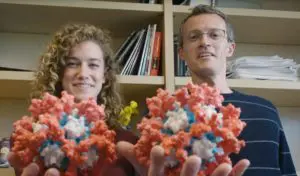Researchers at UW Medicine have created a “second-generation” COVID-19 vaccine, years in the making, that is safe, effective at low doses, simple to manufacture and stable without deep freezing. This means there is finally a vaccine that could reach people in areas where medical, transportation and storage resources are limited.

Dr. Lexi Walls, PhD ‘19, principal scientist at the Veesler Lab, and Dr. David Veesler, associate professor of biochemistry, with 3-D printed, enlarged models of the nanoparticle vaccine.
The vaccine, called SKYCovione, is now approved by the Korean Ministry of Food and Drug Safety for use in people 18 and older in South Korea. If approved by the World Health Organization, the vaccine will be made available through COVAX, an international effort to equitably distribute COVID-19 vaccines around the world.
Additionally, the University of Washington is licensing the vaccine technology royalty-free for the duration of the pandemic. “We know more than two billion people worldwide have not received a single dose of vaccine,” said Dr. David Veesler, associate professor of biochemistry. “If our vaccine is distributed through COVAX, it will allow it to reach people who need access.”
Unlike the earlier COVID-19 vaccines, SKYCovione is made of protein nanoparticles that were designed on computers at UW Medicine’s Institute for Protein Design (IPD). These nanoparticles are studded with fragments of the coronavirus, triggering a powerful immune response.
Work on this groundbreaking vaccine platform actually began in 2016 — long before the COVID-19 pandemic. SKYCovione emerged from a collaboration between two labs, one led by Veesler and the other by Dr. Neil King, an assistant professor at the IPD.
This vaccine wouldn’t have been possible without visionary philanthropic support from many donors and foundations. And, as UW Medicine works on a multi-year flu shot and vaccines to prevent future pandemics, donor support is more important than ever.
